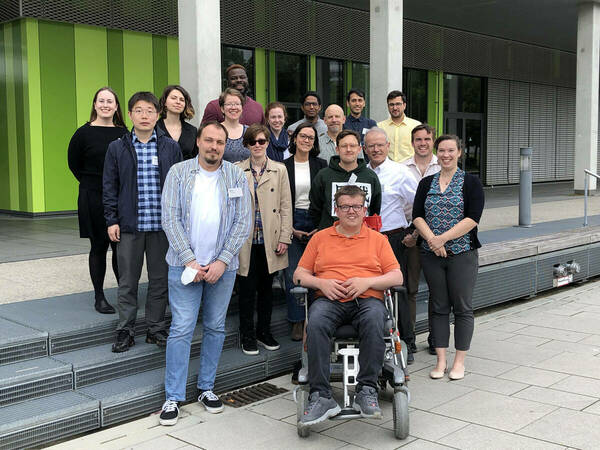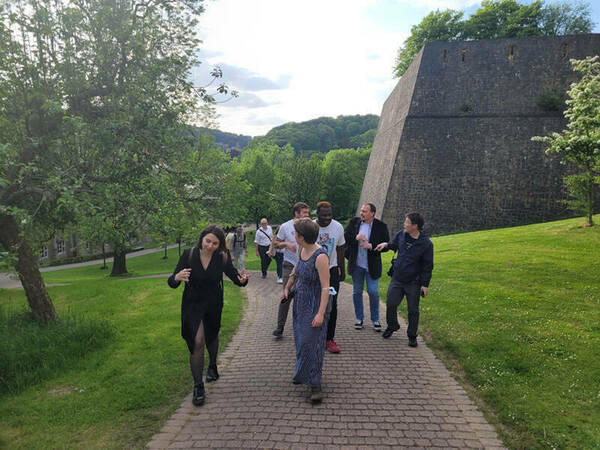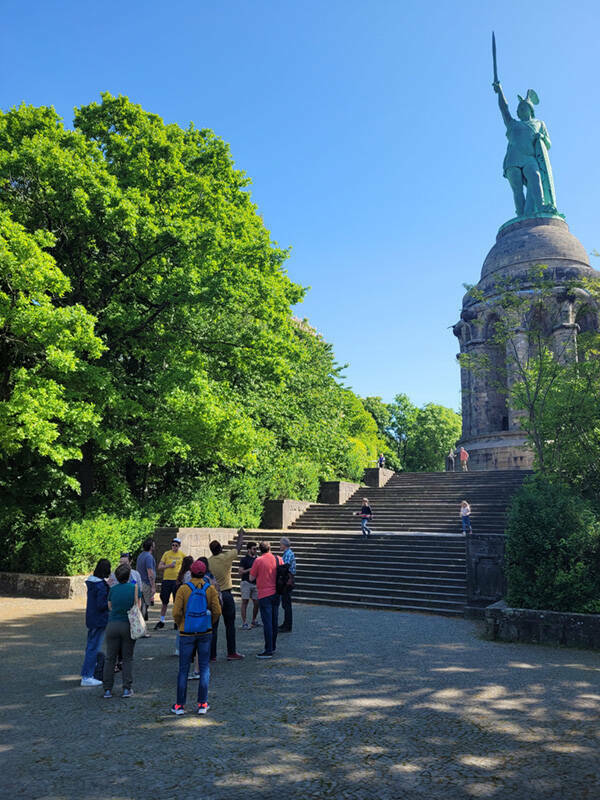
Melissa Coles, Emily Smith, and Z. Efe Antalyali are doctoral candidates in the Department of History at the University of Notre Dame. In May 2022, thanks to funding from the Nanovic Institute for European Studies, they were able to spend five days in Germany participating in the 2022 University of Notre Dame/University of Bielefeld Transatlantic Workshop. The workshop was funded by the Nanovic Institute with additional support from the Notre Dame Department of History.
Participants in the University of Notre Dame/ University of Bielefeld Transatlantic Workshop took their coffee breaks seriously, and for good reason. Over three days, graduate and faculty workshop participants discussed twenty projects. The presentation topics ranged from modern Bangladesh to the North American West, from fifteenth-century Italy to nineteenth-century Haiti. Thanks to generous funding from the Nanovic Institute for European Studies, Notre Dame students were able to meet in person with their counterparts at the University of Bielefeld in north-east Germany, under the leadership of coordinators Dr. Alexander Martin, professor of history at the University of Notre Dame and Nanovic Institute faculty fellow, and Dr. Bettina Brandt, professor of history at the University of Bielefeld.
The annual Notre Dame/ Bielefeld Transatlantic Workshop first met in 2010, with each university taking over hosting responsibilities on alternate years until the disruption of COVID-19 forced the cancelation of the 2020 meeting. Following a virtual meeting in 2021, the 2022 workshop was the first time in three years that the majority of participants were able to gather in person, with a few joining via Zoom. Traditionally, the workshops have involved a mixture of participants who have presented at prior gatherings and those who are new to the event. This flow of returning and new people helps participants deepen existing relationships and form new ones. Marked by engaging conversations and new connections, the 2022 University of Notre Dame/ University of Bielefeld Transatlantic Workshop was a resounding success.
Scholarship enriched by difference

Following the format of previous meetings, every paper presented by a Notre Dame representative at the 2022 workshop received comments from a Bielefeld representative and vice versa, before opening up to the whole group for discussion. As the papers were distributed in advance, the participants had time to read each paper in detail and come up with constructive and helpful feedback.
The discussion was enriched by the differences between the Bielefeld and Notre Dame approaches to history and history writing. The Bielefeld participants’ emphasis on theory helped their Notre Dame colleagues situate their work within larger frameworks and the Notre Dame participants’ focus on primary sources and historiography helped their Bielefeld colleagues sharpen their research questions. The difference between the narrative strategies employed by the Notre Dame and the Bielefeld graduate students was also a topic of conversation throughout the visit. Whereas the humanities education of the Notre Dame students led them to put more emphasis on storytelling, the social science approach of their Bielefeld peers showed itself in the ubiquity of statistics, tables, and graphics. This difference in narrative strategies constituted another point of cultural and intellectual exchange between the particularist approach of the Notre Dame students and the generalizing and theoretical tendencies of the Bielefeld Students. In this sense, participants’ active engagement across institutional lines made the workshop’s dialogues rich and productive.
The experience of the Europeanists at the workshop provided another example of engagement across institutional and historical approaches. In the 2022 workshop, projects focusing on the history of Europe constituted about half of the schedule. The rich conceptual toolkit of the Bielefeld school opened fresh analytical avenues for the Europeanists of Notre Dame to critically study and understand Europe. Getting in touch with students who study the history of Europe in a European university also provided an important occasion for the Europeanists of Notre Dame to better understand and catch up on the currents of the European intellectual world. On the other hand, the perspectives of Notre Dame Europeanists alerted the students of Bielefeld to the intellectual and cultural lenses through which the history of Europe is being discussed in American academia.
Workshop participants discussed how these different ways of studying Europe and other regions can complement and contrast with each other. For instance, the Notre Dame students’ interest in the formation of the modern spatializations of Europe and the role of the Mediterranean world in the making of modern Europe brought forth a fruitful discussion between the Bielefeld and Notre Dame students. In turn, students from Notre Dame greatly admired the theoretical tools employed by their Bielefeld counterparts to better understand the historical geography of Europe. The 2022 workshop was very successful in helping participants from both universities to reformulate, improve, and sharpen their research.
A new band of international colleagues and friends

Every other hour, Notre Dame/ Bielefeld workshop participants filed out of the conference room and had the opportunity to get to know each other over hot beverages, sugar cookies, and tart physalis ground cherries. Conversations on history and theory, dissertation writing, and graduate programs continued over leisurely cafeteria lunches and into some of the many interesting restaurants and bars around Bielefeld. Most of the Notre Dame visitors spent their nights at a hotel and enjoyed the bounties of a German breakfast buffet in the mornings. Two visitors had the pleasure of staying with some extremely gracious Bielefeld graduate students who welcomed them into their homes and daily lives. In all, the workshop supplemented structured scholarly discussion with ample free time to explore Bielefeld and get to know its inhabitants.
One of the highlights of the Notre Dame contingent’s time in Bielefeld was a day-long excursion to the Weser region. While the group craned their necks to behold the statue of the Germanic chieftain Arminius against the backdrop of the Teutoburg Forest, Professor Brandt shared the political and gendered history that led to the construction of the Hermannsdenkmal — a monument to the defeat of the Romans at the hands of Arminius and his forces. The next stop was a guided tour of the Fürstliches Residenzschloss Detmold — a princely residential castle with origins in the 14th century — where the group shuffled in special shoes across ornate wooden floors and through gilded rooms under Murano Glass chandeliers. After leisurely dining al fresco in the town of Lemgo, the excursion culminated with an afternoon interacting with the innovative Minden Preußenmuseum, curated by the historian and sound artist Dr. Sylvia Necker. For many participants, this excursion was a rare opportunity to experience and engage with European public history, architecture, historical monuments, and museum studies.
Though Zoom workshops connect people across the world and might alleviate the administrative labor and practical challenges of pandemic travel, the University of Notre Dame/ University of Bielefeld 2022 Transatlantic Workshop reinforced that in-person connection is far superior and absolutely necessary. Discussions that originated in the conference room evolved over shared coffee, food, and beer during breaks and over the course of a delightful excursion. The Notre Dame group has returned to the United States with new perspectives on their scholarship and a new band of international colleagues and friends from Universität Bielefeld. The participants are deeply grateful to the Nanovic Institute for European Studies and to Notre Dame’s Department of History for facilitating this intellectually formative experience. We look forward to reuniting with our German counterparts next year in South Bend!